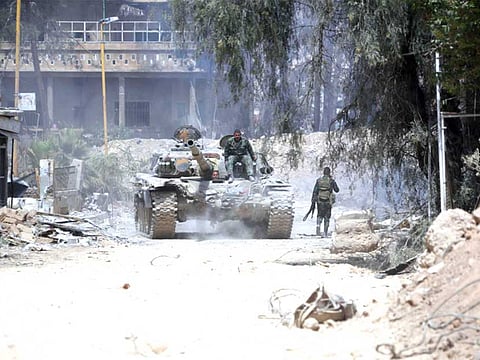Syria’s agony should not go unanwered
Use of chemical weapons is considered a war crime and prohibited in international treaties, but there doesn’t seem to be anyone who can take a call on that

Yet again, yet another unspeakable atrocity. And dozens of Syrian civilians die horribly after poison gas is dropped by their government’s planes on the besieged rebel enclave of Douma, outside Damascus — the last stronghold held by the rebels in Syria’s civil war that has now entered into the seventh year.
The legendary volunteer rescue force, White Helmets, tweeted grisly images that showed lifeless men, women and children sprawled out on floors in their homes and staircases. “Some of the footage showed piles of bodies in concrete stairwells, foam visible on their noses and mouths. And in other videos, civilians are shown streaming onto a chaotic field clinic where workers were attempting to treat those affected”, a news report in the Washington Post asserted last Monday. “In one, doctors held an inhaler to the mouth of an infant whose body shuddered through ragged breaths. Another showed an ashen-faced man convulsing.”
You turn away in nauseated disbelief at all this, lest you retch and heave, but the images are so stark, so haunting that you feel as if reality has come unglued. What kind of five-headed monster, masquerading as a human being, needs to order his military forces to perpetuate such a monstrous deed — against his very own people, no less — in order to help him sleep at night?
Sadly, such monsters exist among us, walking the same earth, breathing the same air we do, whose mission in life is to go out there and destroy what there is of man in man, and to restore what there is in him of beast. Recall, if you wish, how Nazi concentration camp guards would dump inmates in gas chambers during the day and at night go home for dinner, listen to Chopin, put their children to bed, fret over their dental appointment, and then go to bed — unconcerned about the evil they had let loose, all in a day’s work, as it were.
So equally unconcerned are the leaders and enablers of the Syrian regime in Damascus, who, like those Nazi guards, live two orders of irreconcilably reality. But Syrian President Bashar Al Assad — whom United States President Donald Trump called an “animal” in a tweet last Monday — wants to create a world, an Orwellian world, as it were, where Syrians would constantly have before their eyes the totalitarian mechanism of minimal hope: You go on living only if you do things to the regime’s satisfaction. But the “doing” always involves a choice so hideous, so degrading, that it reduces to a fragment the humanity of those who make it. And to rebel against that degradation you risk having nerve gas dropped on the home where you, your wife, your children, your elderly parents live.
Meanwhile, Russia, which has intervened militarily in Syria in support of that very Syrian regime, has embraced its own hall of mirrors. Consider this: Russian Foreign Minister Sergei Lavrov claimed earlier this week that “no evidence has been found of a chemical weapons attack in Douma”! And if there were one, it was “staged”! Yes, even in the diplomatic world, things can get, as Alice would put it, “curiouser and curiouser”.
In the year 2013, in the early hours of August 21, two opposition-controlled areas in Ghouta, outside Damascus, were struck by surface-to-surface rockets containing the chemical agent sarin, fired by Syrian regime forces, as a UN investigation team later confirmed. And on August 30, a US government assessment of the attacks was published by the White House — with a longer classified version made available to members of Congress — which squarely blamed that same regime, stating that 1,429 people were killed, including at least 426 children.
America’s response? The then US president Barack Obama, who had the previous year warned that the use of chemical weapons by the regime in Damascus would constitute the crossing of a “red line” that would demand an American response, retracted on that warning. Syria’s response to America’s response? Free at last, free at last! Now we go on poisoning more of those among our own people whom we consider recalcitrant.
Now, after the horrors of Douma, President Trump is faced with the same challenge that Obama had opted to shy away from meeting. How will the US president, along with others in the international community, respond? Last Sunday, he said: “There will be a big price to pay.” By late Monday, he was condemning the attacks as “barbaric” and saying that a major decision would follow “within the next 24 to 48 hours”. All well and good.
Chemical weapons are weapons of mass destruction and their use is considered, in international law, a war crime, prohibited in a series of international treaties. Will those who uphold that law, first among them the US, the putative leader of the free world, let the Syrian regime’s atrocities stand?


